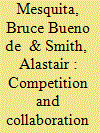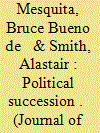| Srl | Item |
| 1 |
ID:
148030


|
|
|
|
|
| Summary/Abstract |
Despite the extensive empirical and theoretical research into foreign aid, there remains little or no formal analysis of aid giving in a competitive donor environment. We endeavor to fill this lacuna with both a model and empirical analysis of aid-for-policy deals with rival aid donors. The model indicates that a dominant donor captures all the surplus from any deal. We test several hypotheses that follow from the model. We demonstrate that the United States paid less (in constant dollars) and gained more in policy terms through aid before the Soviet Union became a significant aid player. Once the Soviet Union became a player in the international aid arena, the United States paid more for aid and got less by way of security concessions from recipients.
|
|
|
|
|
|
|
|
|
|
|
|
|
|
|
|
| 2 |
ID:
152410


|
|
|
|
|
| Summary/Abstract |
In addition to everyday political threats, leaders risk removal from office through coups and mass movements such as rebellion. Further, all leaders face threats from shocks such as downturns in their health, their country’s economy, or their government’s revenue. By integrating these risks into the selectorate theory, we characterize the conditions under which each threat is pertinent and the countermoves (purges, democratization, expansion of public goods, and expansion of private benefits) that best enable the leader to survive in office. The model identifies new insights into the nature of assassins; the relative risk of different types of leader removal as a function of the extant institutions of government; and the endogenous factors driving better or worse public policy and decisions to democratize or become more autocratic. Importantly, the results highlight how an increase in the risk of deposition via one means intensifies other removal risks.
|
|
|
|
|
|
|
|
|
|
|
|
|
|
|
|